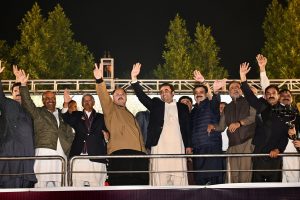After months of uncertainty over whether and when elections will be held, Pakistan’s political scene is buzzing with excitement. The country will vote on February 8 in elections to the National Assembly and four provincial legislatures.
Last week, the process took a significant step forward when political parties and politicians rushed to file their nomination papers.
The Election Commission of Pakistan (ECP) has begun scrutinizing approximately 28,000 candidates, who have filed their papers to contest the upcoming elections. This is a 33 percent increase over the 21,425 candidates who applied to contest the 2018 polls.
With over 7,000 male and 500 female candidates submitting papers for National Assembly seats, it is evident that the gender balance remains heavily skewed in favor of men.
A staggering 17,000 nominations have been filed for seats in the provincial assemblies of Punjab, Sind, Balochistan and Khyber Pakhtunkhwa. Nearly 1,500 nomination papers have been received by the ECP for seats reserved for women and non-Muslims in parliament.
Around 400 non-Muslims have submitted their nomination papers to contest in the provincial assembly elections. Of the reserved seats for minorities in the provincial assemblies, 361 men and 32 women have submitted their papers. Similarly, for the National Assembly, the numbers stand at 140 men and 10 women respectively.
Several former premiers are contesting from multiple constituencies in the National Assembly election. Former Prime Minister and founder of the Pakistan Tehreek-e-Insaf (PTI) Imran Khan has submitted nomination papers from Mianwali, Lahore and Islamabad constituencies, while Nawaz Sharif, the leader of the Pakistan Muslim League-Nawaz and a three-time prime minister, is seeking re-election from Lahore and Mansehra. Similarly, former Foreign Minister and head of the Pakistan People’s Party (PPP) Bilawal Bhutto Zardari is running from constituencies in Larkana and Lahore. Outgoing Prime Minister Shehbaz Sharif is running for a seat in the national parliament from Punjab’s capital, Lahore.
The Pakistan Tehreek-e-Insaf (PTI), which has previously claimed unfair treatment at the hands of the ECP has shown enthusiasm for participation in the elections. It has filed the maximum number of candidates. This unexpected turn of events signals that parties are keen to participate in the democratic process.
Despite speculation and rumors about potential delays, both the caretaker government and the ECP have reiterated their commitment to conducting elections on time. The ECP also appears to be making efforts to ensure that the electoral process has a semblance of credibility. Recent reports suggest that the ECP is going to be very tough in its scrutiny of nomination papers, taking steps to maintain transparency and fairness in the upcoming elections.
To strengthen its efforts, the ECP has set up a special center to coordinate with various government bodies, including the Federal Board of Revenue (FBR), National Accountability Bureau (NAB), State Bank of Pakistan (SBP), Federal Investigation Agency (FIA), and National Database and Registration Authority (NADRA). This collaboration aims to determine the eligibility of candidates by thoroughly examining their financial records, criminal history, and other relevant information.
It is anticipated that due to this rigorous scrutiny process, hundreds of aspirants might fail to meet the criteria set by the ECP and consequently be disqualified from contesting in the elections. While this could dash the aspirations of several candidates, the ECP appears committed to allowing only eligible individuals to run for office.
To maintain transparency, it has even gone as far as ordering the removal of key officials such as the Inspector General Islamabad and the Deputy Commissioner Islamabad due to their alleged connections with certain political leaders. Moreover, the ECP has also taken notice of complaints raised by political parties such as PTI regarding the alleged lack of a “level playing field” and ordered an inquiry into suspected irregularities.
The upcoming elections in Pakistan hold immense significance as they have the potential to shape the future of the country. Key institutions, including the military, recognize the importance of having an elected government in office for effective engagement with the world, particularly regarding financial matters. Stability is crucial for Pakistan at this critical juncture, and these elections have the potential to offer a pathway towards achieving it. However, it is essential that the electoral process unfolds smoothly and without any controversies. This includes ensuring that all parties involved feel included and not sidelined.
By ensuring a fair and inclusive electoral process, Pakistan can pave the way for a transparent and accountable government that represents the aspirations of its people. It is through such democratic processes that the nation can forge ahead with regard to development. Pakistan has had a difficult few years in terms of maintaining political stability in the face of an unstable economy. The last thing Pakistan needs is for the elections to spark yet another wave of unrest.

































